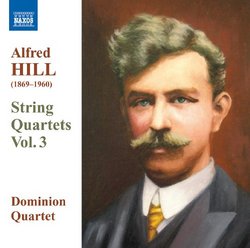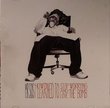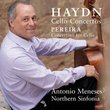| All Artists: Dominion Quartet Title: Hill: String Quartets, Vol. 3 Members Wishing: 0 Total Copies: 0 Label: Naxos Original Release Date: 1/1/2009 Re-Release Date: 12/15/2009 Genre: Classical Styles: Chamber Music, Historical Periods, Classical (c.1770-1830) Number of Discs: 1 SwapaCD Credits: 1 UPC: 747313244676 |
Search - Dominion Quartet :: Hill: String Quartets, Vol. 3
 | Dominion Quartet Hill: String Quartets, Vol. 3 Genre: Classical The Dominion Quartet continues its exploration of the string quartets of Alfred Hill, an Australian-born composer who studied in Europe and lived for much of his life in New — Zealand. The Fifth pays tribute to France, Amer... more » |
Larger Image |
CD DetailsSynopsis
Product Description The Dominion Quartet continues its exploration of the string quartets of Alfred Hill, an Australian-born composer who studied in Europe and lived for much of his life in New Zealand. The Fifth pays tribute to France, America, Italy and Britain, nations that were allies during World War I. In the Seventh, hints of the music of Debussy, Ravel and Dvorak coexist within Hill's own Late Romantic idiom. The Ninth, with its touches of Iberian colour, Impressionist passages and Czech harmonies show Hill as a musical citizen of the world. Similar CDs
|
CD ReviewsA Mixed Bag J Scott Morrison | Middlebury VT, USA | 01/11/2010 (3 out of 5 stars) "Alfred Hill (1869-1960) was one of the first important Australian composers. He was born there but grew up in New Zealand until he left for Leipzig to study music. He then spent most of his adult life in Australia where he was a prominent quartet player, pedagog and composer. I was not impressed with the first issue in this series and skipped hearing the second. But I decided that the third issue deserved a listen. Unfortunately I again have very mixed feelings about both the music and the performances. The Fifth Quartet (1920), subtitled 'The Allies' (referring to the Allies in the First World War) and with movements about France, America, Italy and Britain, is a loosely constructed and awkwardly written (and long at thirty minutes) collection of bits and pieces, few memorable themes. It is played with gawkiness by the Dominion Quartet, a group from New Zealand who also played on the earlier issues. Perhaps it's me but I was put off by the plummy vibrato (especially by the first violin and the cello) and the often dodgy intonation and ensemble.
The Seventh Quartet suffers even more from the quartet's deficiencies. And the quartet itself is no more attractive. But then we come to the altogether lovely Ninth Quartet! It was written only a year after the Seventh but its confidence and strong construction, along with its memorable themes, makes it a remarkably more attractive work. Hill's style is late Romantic. Those who love Tchaikovsky and Dvorák may find things to like here. Although the booklet note writer, Donald Maurice (who is the Dominion Quartet's violist) mentions traces of impressionism in the later quartets, I simply did not hear them. But the traces of late 19th century harmonies are quite apparent. I can recommend the third of the three quartets recorded here, but have to pass on the earlier two. And, lets be honest, Alfred Hill was not a great or even a particularly good late romantic composer. Still he played an important part in the history of classical music in Australia and for that should be honored. Scott Morrison" |




